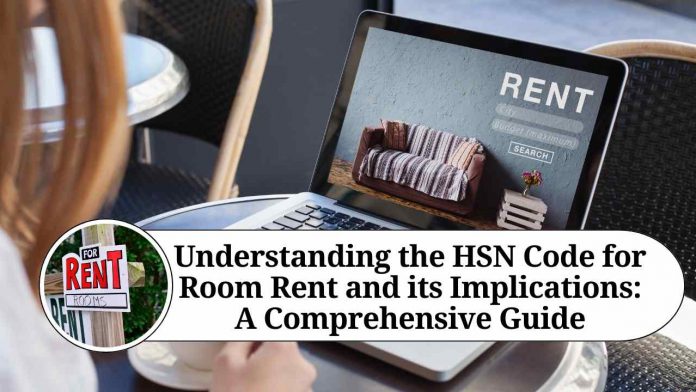INTRODUCTION
When it comes to renting out a property, whether it’s a room or a whole building, it’s important to understand the tax implications of the transaction. One of the key considerations is the Harmonized System of Nomenclature (HSN) code, which is used to classify goods and services for taxation purposes.
In India, the HSN code for room rent is 9963. This code falls under the broader category of “Renting of immovable property services,” which includes the rental of land, buildings, and other immovable property.
If you are renting out a room, it is important to understand your tax obligations. Under the Goods and Services Tax (GST) regime, all rental income is subject to tax. The rate of tax depends on various factors such as the type of property being rented out, the duration of the rental agreement, and the amount of rent being charged.
For renting out a residential property, the GST rate is typically 5%. However, if the rental income exceeds Rs. 20 lakhs per year, then the landlord must register for GST and collect the tax from the tenant. If the landlord is already registered for GST, then they must file regular GST returns and pay the tax on their rental income.
It’s worth noting that the HSN code for room rent is also used for other related services, such as the renting of conference rooms, banquet halls, and other event spaces. In these cases, the tax rate may be higher than the standard 5%, depending on the nature of the service being provided.
Apart from the GST implications, there are other important aspects to consider when renting out a room. These include the terms of the rental agreement, the security deposit, and the maintenance of the property.
Firstly, it is important to have a written rental agreement in place that clearly outlines the terms and conditions of the rental. This agreement should include details such as the rent amount, the duration of the rental, the security deposit, and any other relevant terms and conditions.
Secondly, it is common practice to collect a security deposit from the tenant before they move in. This deposit is typically equivalent to one or two months’ rent and is meant to cover any damages or unpaid rent at the end of the rental period. The landlord must ensure that the deposit is refunded to the tenant at the end of the rental period, provided that there are no outstanding dues or damages.
Finally, the landlord is responsible for maintaining the property in good condition during the rental period. This includes ensuring that the room is clean and well-maintained, that any repairs or maintenance issues are addressed promptly, and that the tenant’s privacy and security are respected.
Conclusion
In summary, renting out a room can be a good source of income, but it is important to understand the legal and tax implications of the transaction. By being aware of the HSN code for room rent, the associated GST rates, and other important considerations such as the rental agreement, security deposit, and property maintenance, landlords can ensure that their rental transactions are conducted in a legally compliant and financially sound manner.
Other Related Blogs: Section 144B Income Tax Act
Frequently Asked Questions (FAQs)
Q: What is the HSN code for room rent?
A: The HSN code for room rent is 9963.
Q: Is rental income taxable under GST?
A: Yes, all rental income is subject to GST in India. The rate of tax depends on various factors such as the type of property being rented out, the duration of the rental agreement, and the amount of rent being charged.
Q: What is the GST rate for residential property rental?
A: The GST rate for residential property rental is typically 5%.
Q: Do landlords need to register for GST if their rental income exceeds Rs. 20 lakhs per year?
A: Yes, if the rental income exceeds Rs. 20 lakhs per year, then the landlord must register for GST and collect the tax from the tenant.
Q: Is it important to have a rental agreement in place when renting out a room?
A: Yes, it is important to have a written rental agreement in place that clearly outlines the terms and conditions of the rental. This agreement should include details such as the rent amount, the duration of the rental, the security deposit, and any other relevant terms and conditions.
Q: What is a security deposit and how much should it be?
A: A security deposit is a sum of money that the landlord collects from the tenant before they move in. This deposit is typically equivalent to one or two months’ rent and is meant to cover any damages or unpaid rent at the end of the rental period.
Q: Who is responsible for maintaining the property during the rental period?
A: The landlord is responsible for maintaining the property in good condition during the rental period. This includes ensuring that the room is clean and well-maintained, that any repairs or maintenance issues are addressed promptly, and that the tenant’s privacy and security are respected.




















